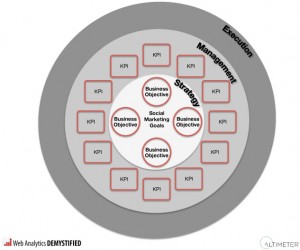This post got its inspiration from Building Data Into The Stuff That Agencies Make written by @kevinrothermel where he spoke about integrating data into the work that agencies do. I thought this was an important idea and perhaps something that is not often thought about enough when awesome and creative works of advertising, public relations or marketing are put in front of consumers.
In considering how to integrate data to effectively measure a campaign or initiative (as well as to ensure that measurement is most effective overall!) it is in my honest opinion necessary that it is put in place from the very start! I don’t mean the first day of the campaign or when all the pieces of the initiative are starting to come together but starting when the very first utterance of the initiative is said long before it is even decided what is going to be done.
Measurement At The First Meeting:
All marketing and even more generally communications efforts have a goal of what they are to achieve. This is the basis of what the measurement initiative should be. In the end the firm wants to measure how effectively their efforts work to achieve the end goal. Having this goal set out clearly and understanding of how measurement can be integrated will spark everything to come.
Reviewing Past Data:
Remember all of those reports you had from previous campaigns? They aren’t something that should be put on the shelf once you have reviewed it at campaign end. They should be categorized and brought out every time you start to plan an initiative. Why? Because they hold the key learnings that you can form your strategy around. From this data you can see what worked, what didn’t and what can be reused in your work going forward. Without consulting with what you previously did you doom yourself to repeat the same mistakes.
Realizing Your deficiencies:
With your goals and your plan nearly in place you can begin to realize if measurement can be done thus allowing the project to move forward. Simply put, if you can’t measure an initiative based on its goals then it should be highly questionable if it should go forward. If you don’t know whether something did great or completely flopped there is no way you can go back to your stakeholders and prove that you didn’t waste their money. Some limitations in measuring a campaign can be technical (does the technology exist to measure this?) or can be as a result of a strategic or tactical issue where the campaign is improperly aligned or perhaps the campaign goal set at the start needs to be revaluated as its either not defined enough or just unrealistic.
Improving The Visibility Of Measurement:
The point in all this that I’m trying to make plain and simple is that measurement needs to be given as much attention as everything else. Effectively measuring your work cannot be done when measurement is brought in as an afterthought because then its effectiveness is compromised. When its brought in at the start of the process it is then kept at top of mind and as a result allows any opportunities or potential difficulties to be considered. In a continually competitive landscape measurement isn’t a nice to have but a must have to prove your work.
